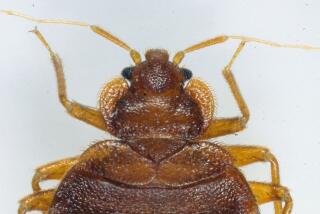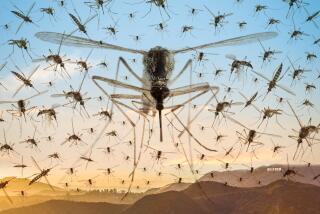West Urged to Enliven Diet, Dine on Bugs
- Share via
CANTERBURY, England — Chocolate-coated crickets, canned worms and toasted bugs may be delicacies in some countries, but the idea of eating insects as a method of pest control has yet to catch on.
A British entomologist has suggested that the Western world--generally averse to munching bugs--could enrich and enliven its diet by the use of insects.
“Western people see insects as almost universally repugnant, particularly as food items, even though there is no scientific reason to support such a view,” Dr. Dick Vane-Wright told the British Pest Control Assn.’s annual conference here.
“What’s so wrong with eating an apple and biting into a maggot,” he said.
Vane-Wright, from the Natural History Museum, cited many examples of insects eaten around the world:
Canned Mopani worms in hot chili sauce in South Africa; toasted wasps and water bugs in Thailand; caterpillars and midges in Africa; ants and butterflies in South America; baked witchetty grubs in Australia, and Chocolate Chirpies (sugar-coated crickets) in parts of the United States.
Many bugs can also be used as animal feed.
Locusts--Vane-Wright calls them “flying scampi”--termites, flies and beetle larvae have more protein, weight-for-weight, than beef, chicken and milk.
They are low in fat and contain valuable minerals and vitamins. Eating them, said Vane-Wright, could help cut the heavy cost of chemicals used in pest control programs.
“The tendency to see so-called pests as undesirable . . . has led to unnecessary conflict with nature, often at great economic cost and increasing risk to human health,” he added.
Trevor Lawson, of Rentokil, official rat-catchers to Queen Elizabeth, warned that global warming could mean more beetles, houseflies and cockroaches in Britain and new tropical bugs, such as the Khapra beetle and malarial mosquito, setting up home in warmer northern climes.
Average global temperatures are expected to rise by 1.5 degrees centigrade within the next 50 years, Lawson told the conference.
He said termites are already found in Paris.
The increased movement of goods and people will also lead to more outbreaks of exotic pests like the Colorado Beetle, scourge of potato crops, and the Black Widow Spider, he warned.
Already the Surinam cockroach has been found in the compost of tropical plant displays at one of the many new water leisure centers in Britain.
As new pests arrive they will bring new diseases with them. Hantavirus Disease and Lyme Disease were found recently in Britain, brought in by rodents and ticks.
A virulent strain of dengue, a tropical infection that kills up to one in 10 children affected, is set to move to Europe, said Dr. Norman Gratz, consultant to the World Health Organization (WHO).
Gratz said the disease carrier, a close relative of the mosquito, had hitched a lift on the global trade in used tires to move to Italy, and could spread from there.
As global warming speeds up pest development, so the bugs will build up resistance to the chemicals designed to control them, Lawson said.
This means the pest control industry will have to refocus its control methods away from traditional chemical insecticides toward biological control--through killer fungi and viruses--and physical controls like better baiting and trapping.
More to Read
Sign up for Essential California
The most important California stories and recommendations in your inbox every morning.
You may occasionally receive promotional content from the Los Angeles Times.










